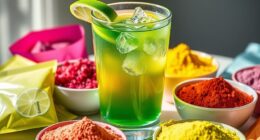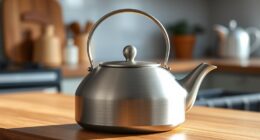Step into a world of natural remedies and soothing flavors with herbal teas. These aromatic blends, crafted from dried flowers, leaves, and herbs, offer a wide range of health benefits and delicious varieties.
From aiding digestion to promoting better sleep, herbal teas are a holistic way to enhance your well-being.
Explore the diverse flavors and discover the transformative power of herbal teas in this enlightening article on their health benefits and varieties.
Key Takeaways
- Herbal teas offer a variety of health benefits, including improving overall well-being and boosting the immune system.
- Chamomile tea promotes relaxation and relieves stress, while peppermint tea soothes digestive issues.
- Herbal teas can aid in digestion by soothing stomach discomfort, bloating, indigestion, and gas.
- Herbal teas have stress-relieving properties and can help promote better sleep.
Types of Herbal Teas
You can explore a wide range of herbal teas to find the flavors and health benefits that suit your preferences. Herbal tea blends offer a delightful combination of herbs, flowers, and spices, creating unique flavors that can tantalize your taste buds. From calming chamomile to invigorating peppermint, there are countless options to choose from.
One popular herbal tea blend is chamomile lavender, which combines the soothing properties of chamomile with the floral aroma of lavender. This blend is known for its calming effects and is often enjoyed before bedtime to promote relaxation and a restful sleep.
If you prefer a more refreshing flavor, you might enjoy a blend of peppermint and lemon balm. Peppermint offers a cooling sensation while lemon balm adds a hint of citrusy sweetness. This blend isn’t only invigorating but also has digestive benefits, helping to soothe an upset stomach.
For those seeking a blend with immune-boosting properties, try a combination of echinacea, elderberry, and ginger. Echinacea is believed to enhance the immune system, while elderberry is known for its antiviral properties. Ginger adds a spicy kick and aids in digestion.
These are just a few examples of the wide variety of herbal tea flavors and blends available. Each blend offers its own unique taste and health benefits, so feel free to experiment and find the ones that resonate with you.
Health Benefits of Herbal Teas
Drinking herbal teas can improve your overall well-being and boost your immune system. Not only do these teas offer a delightful taste, but they also provide numerous health benefits.
Herbal teas are made from a variety of herbs, each with its own unique properties. Some popular types of herbs used in herbal teas include chamomile, peppermint, ginger, and echinacea. These herbs are known for their soothing and healing properties, making them excellent choices for promoting wellness.
When brewing herbal teas, it’s important to use the proper techniques to ensure maximum benefits. First, start by selecting high-quality herbs from trusted sources. Next, boil water and pour it over the herbs, allowing them to steep for the recommended amount of time. This allows the herbs to release their beneficial compounds into the water. Finally, strain the tea and enjoy it while it’s still warm.
Research suggests that herbal teas can support various aspects of your health. For example, chamomile tea has been shown to promote relaxation and relieve stress. Peppermint tea may help soothe digestive issues, while ginger tea can alleviate nausea and inflammation. Echinacea tea is known for its immune-boosting properties, helping to ward off common illnesses.
Incorporating herbal teas into your daily routine can have a positive impact on your overall well-being. By understanding the types of herbs used and employing proper brewing techniques, you can harness the full potential of these natural remedies. So why not indulge in a cup of herbal tea today and experience the many health benefits it has to offer?
Digestive Benefits of Herbal Teas
If you’re experiencing stomach discomfort or looking to promote healthy digestion, herbal teas can be a great natural remedy. These teas are known for their soothing properties and can help alleviate symptoms such as bloating, indigestion, and gas.
With a wide variety of herbal teas available, you can find the perfect blend to support your digestive health.
Soothing Stomach Discomfort
Feeling a bit of stomach discomfort? Peppermint tea can help soothe your tummy.
Peppermint has long been used for its healing properties and is a popular choice in herbal remedies for digestive issues. It contains a compound called menthol, which has a calming effect on the muscles of the gastrointestinal tract, helping to relieve symptoms such as bloating, gas, and indigestion.
Scientific studies have shown that peppermint tea can help relax the muscles of the stomach and intestines, reducing spasms and promoting smoother digestion. It also has an analgesic effect, providing relief from stomach pain.
For best results, steep one teaspoon of dried peppermint leaves in a cup of hot water for 5-10 minutes, then strain and enjoy. Sip slowly and let the soothing properties of peppermint tea work their magic on your troubled tummy.
Promoting Healthy Digestion
To promote healthy digestion, try incorporating fiber-rich foods into your diet. Fiber acts like a broom, helping to sweep waste through your digestive system and prevent constipation.
Here are five fiber-rich foods that can help promote healthy digestion:
-
Whole grains: Opt for whole wheat bread, brown rice, and oats, which are rich in fiber and can help regulate bowel movements.
-
Fruits and vegetables: Berries, apples, pears, broccoli, and carrots are excellent sources of fiber and can add bulk to your stool.
-
Legumes: Lentils, chickpeas, and black beans aren’t only high in fiber but also provide a good source of plant-based protein.
-
Nuts and seeds: Almonds, chia seeds, and flaxseeds are fiber-packed snacks that can help keep your digestive system running smoothly.
-
Water: Staying hydrated is vital for healthy digestion. Drinking enough water promotes proper digestion and can help reduce bloating.
Stress-Relieving Herbal Teas
Looking to find some relief from stress? Look no further than stress-relieving herbal teas. These teas have been used for centuries to calm the mind and promote relaxation.
With options like chamomile and lavender, you can find the perfect tea to help you unwind.
Chamomile Vs Lavender
If you’re deciding between chamomile and lavender, consider their different health benefits and flavors.
Chamomile is known for its calming properties and can help with insomnia, anxiety, and digestive issues.
Lavender, on the other hand, has a more soothing and relaxing effect, making it great for stress relief and promoting better sleep.
Here are some additional factors to consider:
-
Chamomile benefits: It has anti-inflammatory properties and can help with skin conditions like eczema and acne.
-
Lavender varieties: There are different types of lavender, such as English lavender and French lavender, each with its own unique scent and flavor.
-
Both chamomile and lavender teas have a floral and slightly sweet taste.
-
Chamomile is milder in flavor compared to lavender, which has a stronger and more distinct taste.
-
Lavender can also be used in cooking and baking to add a floral twist to various dishes.
Now let’s explore the best time to drink these herbal teas.
Best Time to Drink
When it comes to herbal teas, timing is everything. The best time to drink these natural brews depends on your individual needs and goals. If you’re looking for a calming and soothing beverage to help you unwind and prepare for a good night’s sleep, nighttime consumption is ideal. Herbal teas like chamomile and lavender can be particularly beneficial in promoting relaxation and aiding in sleep.
To give you a better understanding of the best times to drink herbal teas, here’s a visualization in the form of a table:
| Time of Day | Tea | Benefits |
|---|---|---|
| Morning | Green tea | Boosts energy and enhances focus |
| Afternoon | Peppermint tea | Aids digestion and relieves stress |
| Evening | Chamomile tea | Promotes relaxation and better sleep |
| Night | Valerian root tea | Supports deep sleep and relaxation |
| Anytime | Dandelion root tea | Detoxifies the body and aids digestion |
Now that we’ve covered the best time to drink herbal teas for nighttime consumption and detoxification, let’s explore the next section on immune-boosting herbal teas.
Immune-Boosting Herbal Teas
Try incorporating immune-boosting herbal teas into your daily routine for added health benefits. Herbal teas have long been used for their immune boosting properties and can be a natural way to support your body’s defenses against cold and flu.
Here are five herbal teas that are particularly beneficial for boosting your immune system:
-
Echinacea: Known for its antiviral and antibacterial properties, echinacea can help ward off infections and reduce the severity of cold and flu symptoms.
-
Elderberry: Rich in antioxidants, elderberry can help strengthen your immune system and reduce the duration of cold and flu symptoms.
-
Ginger: With its powerful anti-inflammatory and antioxidant properties, ginger tea can help boost your immune system and alleviate symptoms of respiratory infections.
-
Peppermint: Not only does peppermint tea soothe a sore throat, but it also has antiviral and antibacterial properties that can help fight off infections.
-
Chamomile: Known for its calming effects, chamomile tea also has immune-boosting properties that can help prevent and alleviate symptoms of cold and flu.
Incorporating these herbal teas into your daily routine can provide you with a natural and holistic way to support your immune system and stay healthy during cold and flu season.
Herbal Teas for Better Sleep
Incorporating a cup of chamomile tea into your bedtime routine can promote better sleep and help you wake up feeling refreshed. Chamomile is one of the most popular herbal teas for relaxation and has been used for centuries to aid in sleep. It contains compounds that bind to receptors in the brain, reducing anxiety and promoting a sense of calm. Research has shown that chamomile tea can improve sleep quality, reduce the time it takes to fall asleep, and even alleviate symptoms of insomnia. It’s also a natural remedy for anxiety, which can often interfere with a good night’s rest.
The soothing properties of chamomile can help relax your mind and prepare your body for sleep. Other herbal teas that are beneficial for sleep include lavender, valerian root, and passionflower. Lavender tea has been found to decrease heart rate and blood pressure, promoting relaxation and better sleep. Valerian root tea has sedative properties that can help you fall asleep faster and improve sleep quality. Passionflower tea has been shown to reduce anxiety and improve sleep in individuals with insomnia.
Now, let’s explore how herbal teas can assist with weight loss.
Weight Loss and Herbal Teas
To aid in weight loss, drinking herbal teas can be a beneficial addition to your routine. Herbal teas aren’t only delicious and refreshing, but they also offer numerous health benefits that can support your weight loss journey. Here are five reasons why incorporating herbal teas into your daily routine can help you shed those extra pounds:
-
Herbal teas can boost your metabolism: Certain herbal teas, such as green tea and oolong tea, contain compounds that can increase metabolism and help burn fat more efficiently.
-
Herbal teas can suppress your appetite: Drinking herbal teas like peppermint or chamomile can help curb your cravings and reduce hunger, making it easier to stick to a balanced diet.
-
Herbal teas can aid digestion: Many herbal teas, like ginger or dandelion tea, have natural digestive properties that can improve digestion and prevent bloating, ensuring your body efficiently absorbs nutrients.
-
Herbal teas can provide hydration: Staying hydrated is crucial for weight loss, and herbal teas are a great way to increase your fluid intake without adding extra calories.
-
Herbal teas can promote relaxation: Stress and emotional eating can hinder weight loss progress. Herbal teas like lavender or passionflower can help you relax and manage stress, reducing the likelihood of turning to food for comfort.
Incorporating a variety of herbal teas into your daily routine can’t only support your weight loss goals but also provide you with a delicious and healthy way to stay hydrated and nourished.
Herbal Tea Blends and Flavors
When choosing different blends and flavors, you can explore a wide range of options to find the herbal tea that suits your taste preferences and supports your weight loss journey. Herbal teas offer a multitude of flavors and combinations that not only tantalize your taste buds but also provide various health benefits. By incorporating unique herbal tea flavors into your diet, you can enhance your weight loss efforts while enjoying a soothing and refreshing beverage.
There are numerous herbal tea recipes available that combine different herbs and spices to create delightful flavors. For example, a blend of green tea, ginger, and lemon can help boost metabolism and aid in digestion. Another popular combination is chamomile and lavender, known for their calming properties, which can help reduce stress and promote better sleep – both of which are important for maintaining a healthy weight.
When exploring herbal tea blends, it’s important to remember that while they can support your weight loss journey, they aren’t a magic solution on their own. It’s crucial to incorporate a balanced diet and regular exercise for optimal results. Additionally, it’s always a good idea to consult with a healthcare professional before starting any new diet or weight loss regimen.
Frequently Asked Questions
Can Herbal Teas Interact With Prescription Medications?
Herbal teas can potentially interact with prescription medications, so it’s important to consider medication safety. Some herbal teas contain compounds that can affect how your body metabolizes certain drugs, leading to reduced effectiveness or increased side effects.
It’s crucial to talk to your healthcare provider about any herbal teas you’re consuming, especially if you’re taking prescription medications. They can provide guidance on potential interactions and help ensure your health and well-being.
Are There Any Potential Side Effects of Consuming Herbal Teas?
When it comes to consuming herbal teas, it’s important to be aware of potential risks and long term effects. While herbal teas are generally considered safe, there can be some side effects to be mindful of. These can vary depending on the specific herbs used in the tea.
It’s always a good idea to consult with a healthcare professional, especially if you’ve any pre-existing health conditions or are taking medications, to ensure that herbal teas are safe for you to consume.
How Should Herbal Teas Be Prepared for Maximum Health Benefits?
To maximize the health benefits of herbal teas, it’s crucial to prepare them correctly. Start by choosing high-quality, organic herbs for your brew. Pay attention to the ideal brewing time for each herb, as it can vary.
Steep the tea for the recommended duration to extract all the beneficial compounds. Avoid using boiling water, as it can degrade the delicate properties of the herbs.
Are There Any Herbal Teas That Should Be Avoided During Pregnancy?
During pregnancy, it’s important to be cautious about which herbal teas you consume.
Some herbal teas are safe to drink, such as peppermint, ginger, and chamomile. These teas can help with digestion, nausea, and sleep.
However, there are herbal teas that may have adverse effects on fetal development and should be avoided, such as sage, licorice root, and black cohosh.
It’s always best to consult with your healthcare provider before adding any herbal teas to your pregnancy diet.
Can Herbal Teas Help With Menstrual Cramps or Other Women’s Health Issues?
Herbal teas can indeed help with menstrual cramps and other women’s health issues.
Certain herbal teas, such as chamomile and ginger, have anti-inflammatory properties that can help relieve the pain and discomfort associated with menstrual cramps.
Additionally, herbal teas like raspberry leaf and dong quai are known for their ability to promote hormonal balance in women.
Incorporating these herbal teas into your daily routine may offer natural and holistic support for women’s health concerns.
Conclusion
In conclusion, herbal teas offer a wide variety of health benefits that can enhance your overall well-being. They can aid digestion, reduce stress, boost your immune system, promote better sleep, and even aid in weight loss.
By incorporating these natural remedies into your daily routine, you can experience the healing powers of nature. So why not sit back, relax, and enjoy a soothing cup of herbal tea, as it symbolizes a comforting embrace for your body and soul.





